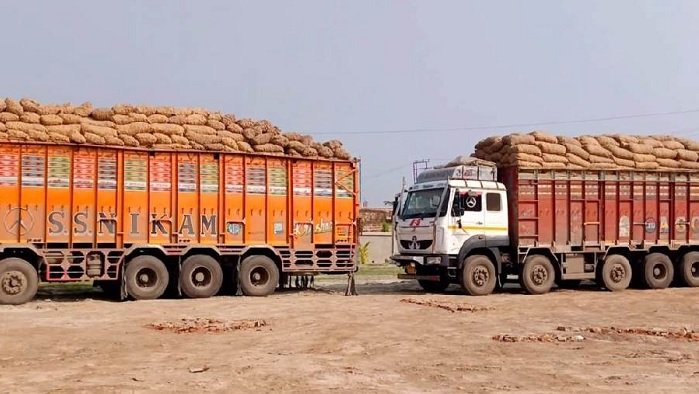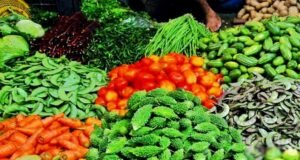
Truckloads of onions have begun stinking along the India-Bangladesh border in Bengal while the prices of the crop move northwards in the neighbouring country, according to a report by The Telegraph Online on Sunday (December 17).
A decision of the central government prohibiting export of onions has suddenly slammed the brakes on several cargo trucks, waiting at land ports along India-Bangladesh border, and the exporters and freight forwarders are staring at a loss as a part of the consignment has begun rotting, the report says.
The export curb decision in India has had an impact in Bangladesh as prices of the crop have shot up — from Tk 80 a kg to Tk 200 a kg — due to a perceived shortfall of onion, a key ingredient in most dishes in the country.
A rough estimate, based on conversations with exporters and freight forwarders, indicates that over 3,000 MT of onions, loaded in 100 cargo trucks and for which the Bangladeshi importers had placed orders before the import restrictions came into effect, are stuck at land ports along India-Bangladesh border.
On December 7, the directorate general of foreign trade, a wing of the Union ministry of commerce and industry, pressed a pause button on the export of onions till March 31, 2024, as part of an attempt to increase the domestic availability of the crop, which now retails for around Rs 70 per kilo. The notification came into effect on December 8.
“At least 1,000 other trucks are on their way to the borders…. The decision has put us in a quandary,” said an exporter.
The impact of the prohibition, however, is not the same across land ports. In Petrapole, the biggest land port in the state, the onion-laden trucks can roll into Bangladesh as they obtained shipping bills before the prohibition came into effect.
The situation is different in Ghojadanga land port, near Basirhat in North 24 Parganas, where around 30 cargo trucks with onions from Nasik have been stuck since December 8.
In Malda’s Mahadipur land port, the count is 70 inside the port while 80 cargo trucks are waiting outside.
“We have been waiting here anxiously for about a week. We could not obtain a bill of export… We will incur huge losses unless the Centre gives us the clearance to ship the consignments…. A part of the consignment has begun rotting,” said the agent of a Nasik-based exporter at Ghojadanga port on Saturday.
Some exporters have begun to shift the packets of onions to nearby godowns to sell at local markets.
“If a large part of the shipment begins rotting, we would be compelled to sell them at throwaway prices…,” the agent added.
Customs authorities said exporters of these stranded consignments did not fulfill any of the three conditions that the government had set while announcing the prohibition. Consignments of onions will be allowed for export under three conditions — if the loading of onions had begun before the notification, if vessels had already berthed or arrived and were anchored at the ports and lastly if the consignments of onions were handed over to Customs and registered in their system or had entered the Customs stations before the notification.
Assistant commissioner of Customs Anil Kumar Singh, “The government order is very clear and it appears that none of these consignments met the conditions.”
Several exporters and clearing agents told this newspaper that the ban on export of onions — triggered by the price hike in the domestic market — was sudden as the orders from Bangladeshi importers were placed before the prohibitory directive came into effect.
The price of onions in Indian domestic markets increased to Rs 58 — a hike of about 90 per cent in early November — apparently due to the delay in the sowing of the kharif onion. Preserved onions, the rabi crop, had exhausted by then. These two factors prompted the government to enforce the export ban.
Bangladesh is trying to reduce its dependence on India for onion by diversifying its import basket and expanding domestic production, a source in Dhaka said.
 Weekly Bangla Mirror | Bangla Mirror, Bangladeshi news in UK, bangla mirror news
Weekly Bangla Mirror | Bangla Mirror, Bangladeshi news in UK, bangla mirror news







